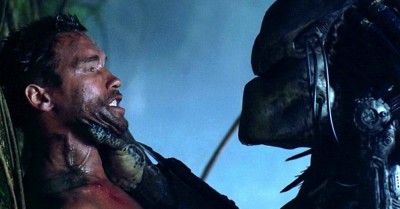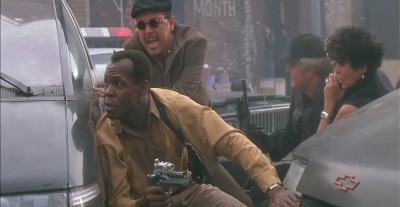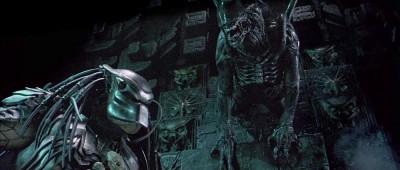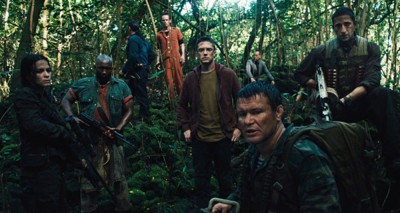Predatory Evolution – A ‘Predator’ Retrospective
As mentioned in the review for The Predator (2018), one of the defining features of the Predator franchise is that each entry tackles a different genre, dropping the titular alien in various hunting grounds and watching the carnage that ensues. Whether this was by design or accident (or the fact that Arnold Schwarzenegger is always unfortunately stopped from reprising his role due to scheduling conflicts), the series has benefited greatly from this, guaranteeing something new in each succeeding chapter.
Right now, the Predator finds itself in suburban America and before going out to see what havoc it can bring in civilization, here’s a look back at the evolution of the Predator franchise and how one of pop culture’s most popular killers started out in a third world jungle before relocating to the modern luxuries of small town America.
Predator (1987) –Predatory Jungles
The first Predator is considered to be an action movie masterpiece, and rightfully so. Despite a troubled production where the Predator was redesigned twice and many crew members got sick while shooting in the jungle, Predator was the perfect blend of action thrillers and horror movies that many have tried but failed to surpass and imitate in the years after is original release.
Predator opens looking just like any ‘80s action movie, with real American heroes violently laying waste to a banana republic with more firepower than an entire country’s armed forces. But then Predator shifts gears and the Special Forces unit led by Dutch (Arnold Schwarzenegger) suddenly finds itself at the mercy of an unseen and nigh-unstoppable foe. What follows next is a tense second half that’s been open to countless interpretations, including a metaphor for American failure in the Vietnam War and a deconstruction of the testosterone-fueled action movies of the decade – a conversation that still rages on up until today.
Predator 2 (1990) – Urban Predation
Unlike other franchise sequels, the second Predator did its best to distance itself from its predecessor instead of repeating everything the first movie did. Transporting the carnage from the Guatemalan fauna to the dystopian urban jungle of 1997 Los Angeles, Predator 2 has more in common with procedural cop stories and urban decay thrillers than it does with survival horror. This tonal shift is further emphasized by its star, Danny Glover – best known for playing Detective Murtaugh in the Lethal Weapon movies – who plays a loose cannon cop in this sequel.
Predator 2 is notable for subtly expanding the lore of the Predators, specifically the revelation that Predators hunt in groups and have been doing so on Earth for a long time – an occurrence the American government is, apparently, well aware of. There is also a bigger emphasis on massive gang wars and overall action than stealth, though there’s no shortage of the latter in the Predator’s second outing.
Alien vs. Predator (2004) and Alien vs. Predator: Requiem (2007) – Predatory Fight Night
Despite featuring the Predator as a main character, the Alien vs. Predator movies are not considered canon. This, however, doesn’t stop the two AVP movies from being examined as part of the Predator series’ evolution and the filmmakers’ desire to modernize the classic creatures.
The first AVP has a watered-down Lovecraftian vibe to it, being inspired by the doomed exploration narrated in H.P. Lovecraft’s At the Mountains of Madness while telling the Predators’ galactic backstory, revealing their feud with the Xenomorphs of Alien fame. Requiem, on the other hand, takes a step back and narrows its outlook by isolating the titular fight to an unsuspecting suburban American town, turning the story into an alien invasion instead of an action-packed conflict or a desperate fight for survival.
Even if both AVP movies aren’t canonical, it should be noted that elements of both movies (i.e. the galactic mythos and the suburban setting) would eventually make their way to this year’s The Predator.
Predators (2010) – Predator Royale
Following the lackluster performance of both AVP movies, the common consensus was that the Predator movies needed to go back to their roots, which is what the soft reboot Predators did. Once more taking place in a jungle and focusing on a group of hardened soldiers and killers, Predators reintroduces the franchise to a new generation, but with some changes that make sure it’s not just a blatant remake of the original movie.
This time around, the mercenary Royce (Adrian Brody) and a group of Earth’s best killers find themselves abducted and dropped in the Predators’ game preserve, where they’re mercilessly hunted down for sport. Here, action takes center stage while also incorporating the survival horror elements of the original movie, which have been absent for some time. And once again, the Predators’ origins are broadened, with the implication that the Predators have a tribal war going on and that they’re trying to evolve through genetic modification, taking the best traits from their kills and trophies – elements that are all but confirmed in The Predator.
The Predator (2018) – Family Friendly Predators
Directed by the guy behind the Marvel Cinematic Universe’s black eye known as Iron Man 3, The Predator stands out by being an action-comedy and a family film – the sharpest turn for the Predator franchise to date. For the fourth canonical entry, the Predator finds itself in an American small town again, albeit not in the throes of an alien invasion/Xenomorph infestation. What awaits the Predators and the human characters, instead, is a government conspiracy right out of an ’80s Sci-Fi movie (think something that Stranger Things would homage) that aims to unearth why the Predators have a preference for human prey in the first place.
The Predator acknowledges franchise continuity by not only referencing the first two movies as notable “incidents” that caught the government’s eyes, but by confirming backstory and motivations that were only hinted at in previous entries. The most notable revelations are the appearance of a Predator/human hybrid, and the truth behind the Predators’ visits and the conflict’s future – which won’t be spoiled here since the movie is currently out in cinemas.
What do you think of the Predator franchise’s evolution? Was it a good transformation, or was it a devolution? What do you think of the revelations in The Predator?
Share your thoughts in the comments below!































